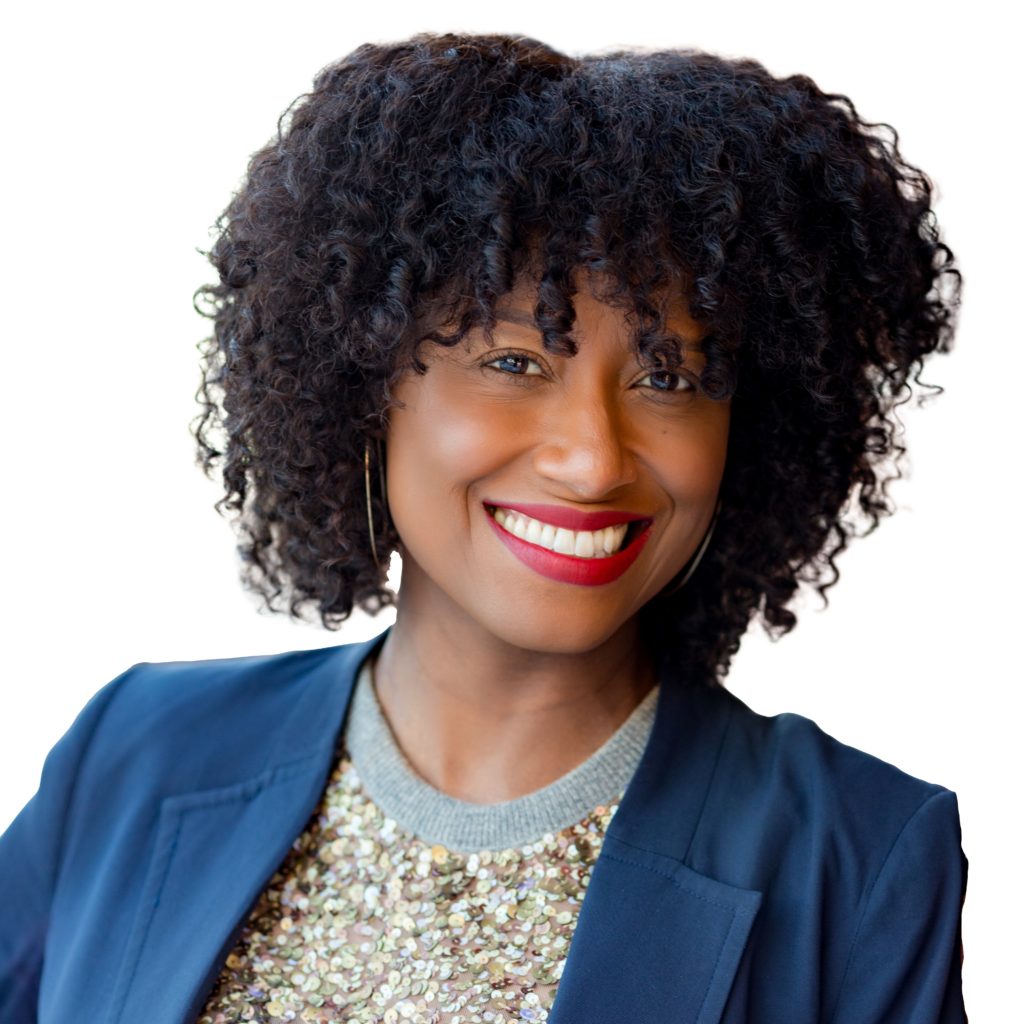Meet The CEO Who Is Working To Close The Gender Gap in Technology

In April 2019, we launched The Power of Good Fund by bareMinerals, which supports women’s empowerment through education. In this series, we’re putting the spotlight on one leader from each organization. Today, we’re proud to share the story of Dr. Tarika Barrett, the CEO of Girls Who Code, an international non-profit working to close the gender gap in entry-level tech jobs by 2023.
It is widely documented and understood that computer science is a field filled with men. In 2012, congressional [hopeful] Reshma Saujani founded a non-profit, Girls Who Code (GWC), to create a talent pipeline filled with young women.
In April 2021, she passed along the organization’s CEO role for the first time, to Dr. Tarika Barrett, a Jamaican-American educator and advocate, who is facing a fresh challenge.
The computer science landscape has greatly changed in the last decade. By now, GWC has reached over 450,000 girls globally, more than half of whom are Black, Latinx or come from historically underrepresented groups in tech. But just having skills is not enough. There is persistent discrimination in hiring — and then there’s what happens to the women who do get hired. Tarika explains: “We need to ensure that young women can persist and succeed in the industry. The data tell a clear story that today the tech industry isn’t welcoming to women, particularly women early in their careers. Our research with Accenture points to 50% of women leaving tech roles in the first 5 years, citing culture as the culprit.” While being a trailblazer is often celebrated from the outside, it can be a lonely pursuit.
Defying odds is hardly unfamiliar to Tarika. “My mother was the first in our family to go to college and get a graduate degree. After going to high school in Kingston, I followed in my mother’s footsteps and came back to the United States for college,” she recalls. “Every day, I would make the hour-long bus ride from the housing project where we lived to the campus of Brooklyn College, where I went to school with other kids of working-class families. Kids who were the first in their families to go to college… kids who were beating the odds just by being there. It didn’t hit me until much later what simply walking through those doors meant to so many of our families.”
Since then, Tarika has dedicated her career to addressing inequities in education and to helping young women — particularly women of color — succeed. Here, she speaks about her promotion to the CEO role, tech’s culture problem (and how to fix it), and the anchors in her day that bring her joy.
You were recently promoted to the role of CEO, succeeding founder Reshma Saujani. What did this promotion mean to you?
I hope that my journey as the CEO of Girls Who Code can and will inspire not only the girls that GWC engages with, but also other women in power. Because of centuries of institutional discrimination, women, particularly women of color, have been forced to compete with each other for a small slice of the pie. But at GWC, we are committed to turning the outdated way of thinking on its head. I know firsthand that women go farther when we work together.
Most importantly, as a woman in leadership, it’s my responsibility to uplift other women — especially women of color. After 5 years working with this organization, I have seen that passionate, ambitious and diverse young women are the key to transforming the world and I am committed to supporting them on their journey from school into the workforce. For the last nine years, Girls Who Code and our community have made progress building and expanding the pipeline. For example, we now have 90,000 college and post-college aged alumni — that is three times the number of women who graduated with a computer science degree in 2019.
What do you see as the biggest barriers to girls succeeding in tech right now?
The earliest barrier is that our culture has a very limited idea of what a coder looks like. At GWC, we always say you can’t be what you can’t see. Girls learn, in school and through culture, about men like Bill Gates and Mark Zuckerberg and Albert Einstein and Neil Armstrong — but not about the women pioneers in the field like Katherine Johnson and Ada Lovelace and Jean Bartik. In their minds, a programmer is a boy in a hoodie alone in the basement, or a man running a company in Silicon Valley. Before girls are 10 years old, they have already internalized these cultural touchstones. And these internalized beliefs resonate throughout their lives: in elementary school, in high school, in college, and in the workforce.
Another barrier is academic credentialing and traditional hiring practices, which offer a narrow and privileged perspective of success, shutting out historically marginalized students and failing to bring much needed diversity to tech companies. Young women from historically under-represented groups make up more than half of our GWC community. These young women are clearly motivated and ready to learn, but often don’t have the same opportunities. They might work multiple jobs while carrying a full college course load, have to balance homework with caregiving responsibilities, or do not have the same resources in their communities that others have. They are the embodiment of bravery and resilience — qualities that are critical to all companies but are not reflected in the conventional academic credentials that tech firms overwhelmingly rely on. This is self-defeating. Computer science is one of the fastest-growing professions in the country, expected to grow 11% between 2019 and 2029, adding another 500,000 new jobs to our economy. We can’t afford to leave a single ounce of tech talent on the proverbial table.
Lastly, the punishing work culture in tech, rooted in systemic racism and sexism, often alienates young women and women of color once they get their first job in the tech industry. Half of women in tech roles leave by the age of 35, many of them because they felt their workplace was inhospitable to women. Maybe these offices didn’t have adequate parental leave policies, or women weren’t represented in the ranks of leadership, or there was just a toxic corporate culture. A study by Girls Who Code and Accenture found that more inclusive work cultures could increase the number of women working in tech by 3 million. So, while the reasons for the gender gap in tech may seem abstract — this metaphysical thing called culture — the solutions couldn’t be more concrete. If we give women the opportunities and tools they need to develop their skills, if we give them access to mentors and role models who make them excited about a career in tech, if we make sure workplaces are welcoming and inclusive, if we agree that an unusually high tolerance for so-called locker room talk should not be a job requirement for women in tech… if we do these things, I guarantee we’ll start to see that gender gap close.
What changes when gender gaps are closed within an industry?
The first and most important thing we gain by closing the gender gap in tech is that we empower young women to seek out the thriving, exciting careers of the future, and offer them the improved quality of life and upward mobility that a career in tech can provide…the median wage in tech is also more than double the median national wage. Young women, and especially young women of color, have a lot to gain from pursuing careers in tech.
We also all stand to gain with a more diverse workforce in the tech industry. Right now, technology best serves only a small group of people because that’s who is given a seat at the table in tech companies. For example, the first iteration of Apple’s Health app didn’t even include any information on menstruation of fertility. This is a glaring omission considering how important menstruation is to women’s health. An app that doesn’t include it feels almost worthless. Recently, a Black teenager was kicked out of a roller-skating rink because facial recognition software, which notoriously fails to identify darker skin, misidentified her as a person who had gotten in a fight there in the past. This is frustrating but not surprising considering that most people in leadership roles in the tech industry are white and male. By shifting this status quo, we can envision a future where the technology we use on a daily basis is more representative of our diversifying world.
Your professional background is in education. Tell us about your own experience growing up.
I spent my early education between New York and Kingston. When I moved to New York to attend Brooklyn College, my mother and sister stayed in Jamaica, so I lived in a rented apartment with grandmother. Yes, my grandmother was my college dorm mate. One of my fondest memories from that time is going with mama to the local seniors’ center where she would spend her free time. She’d proudly introduce me to all her friends, and then, without fail, announce to whoever happened to be in earshot, “She’s an American citizen!”
I’d be so embarrassed. I couldn’t understand why it was important to her that people knew that — until I realized that, to her, America represented opportunities that she’d never had. My belonging here was a kind of vindication, an affirmation that her own struggles had been worth it. Because, really, the only thing separating my experience from hers was education. Education had given me the opportunity to, as the journalist Sydney Harris once put it, to “turn mirrors into windows.” After Brooklyn College, I got a degree in deaf education from Teachers’ College at Columbia University, and went on to get a doctorate in teaching and learning from NYU.
The Girls Who Code site says: “the gender gap in computing is getting worse.” Can you explain what is contributing to this decline?
I think that the tech industry simply doesn’t prioritize supporting women once they enter the workforce. Half of women in tech roles leave by the age of 35, many of them because they felt their workplace was inhospitable to women. Also, the increased fallout that we are seeing from Covid-19 is not an isolated event, but rather the result of issues that have been percolating for years. Many women had to make the difficult decision between their career and their kids. Women are overwhelmingly care givers and that will not change unless we provide resources to support them with this responsibility. Ways in which companies can begin to think about this is by offering childcare, providing paid parental leave, offering flexible and asynchronous work hours, and increasing salaries of women so that they don’t have to make the choice between career and kids. Women did not simply drop out of the work force; they fell because many did not have the support they needed to catch them. As we look ahead, we must think critically about altering how we support women in the workforce to ensure they can persist regardless of what field they are in.
How has Covid-19 impacted the girls you work with?
The pandemic revealed the massive gaps in education for low-income students and students of color — and exacerbated them. Understanding that half of our students come from historically underrepresented groups, we knew we had to act fast to adapt our programming to fit our new reality of virtual learning.
In the first few months of lockdown, we launched Girls Who Code at Home, free downloadable coding activities. We also hosted a Girls Who Code Talks series for alumni, featuring fireside chats with leaders including Secretary Hillary Clinton, Dr. Biden, Soledad O’Brien, Bozoma Saint John, and more.
Our entirely virtual Summer Immersion Program model took into account issues of accessibility facing the hardest-to-reach girls — such as WIFI, hardware, and living circumstances. It also incorporated best practices in digital learning, including shorter days, live and asynchronous instruction, small group work and project-based learning, and office hours. The outcome data for our first-ever virtual Summer Immersion Program, which served 5,000 girls around the world, showed that our virtual programming was as effective as in-person programs the year prior. Moreover, the program saw equally strong outcomes for Black, Latinx and low-income students, who are historically left behind by remote instruction. Students who participated in the virtual program were just as likely to be interested in pursuing a tech career as those who participated in in-person programming. That’s why, this fall, we’re launching our Clubs program with both in-person and all-virtual options. We hope this hands-on engagement will maximize the number of girls who are able to participate, and help ease the transition back to school for those who struggled throughout the pandemic.
We knew it was equally important to support our older alumni who were looking to join the workforce, either through internships or entry level jobs. Due to the pandemic, many of our talented alumni were losing access to opportunities that would have had otherwise. We needed to ensure that they would not lose any momentum on their path to exciting careers. In 2021 we also launched our first ever Hiring Summit, a one-day virtual event designed to connect the GWC community with technical career opportunities, and to connect hiring managers to a diverse slate of candidates. Our inaugural summit, which took place in January, included over 800 girls. One of the companies in attendance ended up hiring 17 of our alumni. These early indicators proved that we were on the right track with our quick pivot to virtual learning, and underscored the importance of continuing to make our programming as accessible and flexible as possible.
As a brand we believe that the “small” choices we make have the power to make a big difference. What’s one “small” choice you’ve made in your own life that’s had a big impact?
I’ve found that letting go of perfectionism has been a game changer for me. This is really like fighting against my nature as a Virgo, but it’s been the greatest tool in business, life, and relationships. Actually, my dear friend [and GWC founder] Reshma Saujani’s book Brave Not Perfect was key in unlearning my own obsession with perfection. I realized other folks go do things without everything being exactly perfect. I’ve always struggled with feeling like I have to be prepared to an unrealistic degree. I’m consciously moving toward being OK with something even if I didn’t give it my 150% effort. I don’t always have to do the most to do something and do it successfully.
What are the books you read when you need inspiration?
To me, representation is critically important in the content I consume, and especially in the books I read. Right now, Eloquent Rage by Brittany Cooper is on my shelf at home — I flew through that book and read it in one cross country flight. I think just existing as a Black woman, your emotions are so policed, especially for Black girls in the classroom. I love the idea that our rage is what makes us strong, smart, capable and extraordinary. It’s not something to be extinguished, but instead something to harness.
Clap When You Land by Elizabeth Acevedo is another title I sped through. It’s a story about how, amid unimaginable grief, two young women make the choice to learn from one another and build each other up.
Electric Arches by Even Ewing is another work that tells the story of a young woman’s journey from girlhood to womanhood in 1990s Chicago that was full of magic, surrealism and art as a way to spark a conversation around identity, belonging, gender and race.
You have a lot of responsibility and face a lot of challenges. How do you decompress? Any tools for navigating a difficult day?
To me, the best resources are my family and my friends, and the rich and captivating stories they tell me. I don’t spend my time on social media and in fact can find it quite empty. For me, it’s about being in the moment. Sitting at that table, with good company. No story is more compelling than my own family and my own friends. Since I do have such limited time, I have to make very intentional choices to keep certain things off my mind and I look to consume content that is rooted in joy. Like Schitt’s Creek.
I also navigate difficult days by creating anchors that bring me joy. My anchors in the morning and night are what help me stay balanced. In the morning, it’s exercising and meditating before I open my email. At night, it’s asking my kids how they’re doing and understanding what they’re struggling with in their life and what’s going well. The simple act of looking into my kids’ eyes and knowing they’re here with me and they’re OK grounds me. I never want to feel like I have no idea what’s going on in their life. I’m by no means perfect, and no one should be expected to be during these unprecedented times. Being able to navigate everything is a learning process. Knowing what grounds you, and making time for those things, is the key to making the toughest days bearable.
Learn more about The Power of Good Fund, and how your bareMinerals purchase supports Girls Who Code. This interview has been edited and condensed for clarity.






